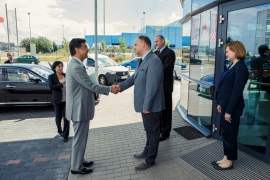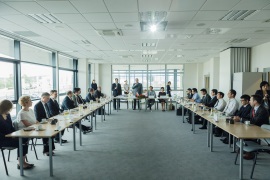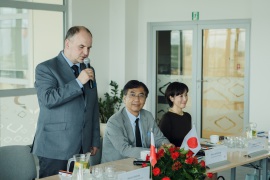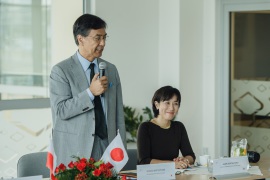The Ambassador of Japan to Poland Shigeo Matsutomi and his wife visited the Wałbrzych Special Economic Zone. The meeting was attended by Japanese entrepreneurs operating within the WSEZ. More than 4,200 people have found jobs thanks to their investments.
Firms with Japanese capital are the second largest group of investors in the Wałbrzych zone in terms of incurred capital expenditure, which has exceeded PLN 5 billion. Only companies with German capital have invested more.
“Japanese firms are trusted business partners and reliable employers, who invest in the professional development of their staff. For this reason we want them to make themselves at home. We do our best to create the optimal conditions for these enterprises to develop,” Maciej Badora, President of the Wałbrzych Special Economic Zone, said during the meeting.
All the Japanese enterprises are based in Lower Silesia. The fact that they feel good in the Wałbrzych zone can be best proven by 25 permits issued to operate here, which have been granted not only to erect new facilities but also to expand the existing ones. As many as four Japanese firms function in the city of Wałbrzych itself: NSK Steering Systems, Poland Smelting Technologies “POLST”, Toyota Tsusho and Toyota Motor Manufacturing Poland – Toyota’s largest production complex in Europe.
“Out of 43 Japanese enterprises functioning in Lower Silesia, 11 function in the Wałbrzych zone. According to questionnaires, they are positive about the conditions of doing business in it,” Mr. Shigeo Matsutomi, the Ambassador of Japan, emphasised during the meeting. “However, we are aware that finding employees with the right skills is becoming increasingly difficult.”
The Wałbrzych zone is involved in adapting education to meet employers’ needs. For this reason, the “INVEST in EDU” Educational Cluster has been created. Its actions will now be adapted to address the new solutions proposed by Anna Zalewska, Minister of National Education.
“We want entrepreneurs to become involved in cooperation with schools and universities. It is crucial for the graduates to be able to find jobs in the region instead of being forced to leave. Their skills and education will also contribute to attracting new investors to the zone,” Mr Badora said.
The meeting also provided an opportunity to discuss issues connected with the development of the WSEZ and the subject of employing foreigners. On their way across the zone, the guests had a chance to see the facilities functioning in Wałbrzych.



















